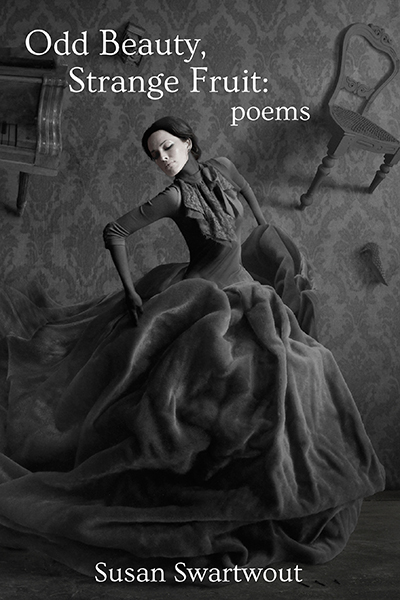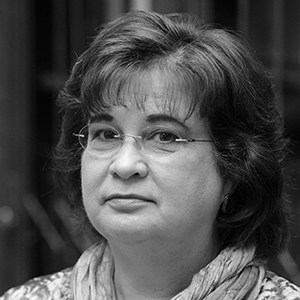
A Southerner by birth, Susan Swartwout's history and writing are steeped in the gothic elements of quotidian life in the Deep South, a celebration of difference and the uncommon—odd beauties who embellish our plain lives. These poems explore the lives of freaks—celebrities of Southern fairs' sideshows—such as conjoined twins Chang and Eng Bunker's married lives, the Fat Lady's work schedule, Tom Thumb’s Barnum-warped ego, all parallel to the hidden desires, plots, and jealousies of the rest of us. Our exterior normality belies the internal twisted landscapes—how complicity and silence echo abuse, how depression infects entire families, how a five-year-old learns to use words as weapons, how human need dispels language's boundaries. From circus oddities to real-life boogeymen, from Louisiana to a Central American village, earth has no dearth of the gothic's strange fruit, illuminating the complexity of what it is to be human.
"Swartwout guides us through fairgrounds, freak shows, and circuses populated with a sideshow of characters like Electra, the Fat Lady, Tom Thumb, conjoined twins Chang and Eng; all of her deft dazzling exposes both the problematic nature of the term 'freak' and the troubling freakishness of our own nature. . . Swartwout, too, knows that each of us create 'attractions' out of our own lives and shape-shift from heroes to freaks and back again. . . .
"The duality of horror and sympathy is evident in Odd Beauty, Strange Fruit, where binaries are irrevocable. While the freakishness of Eng and Chang deals with our perceptions of normalcy, and our desires for individuality, Swartwout also explores the seemingly normal’s undercurrent of perversity. In 'Louisiana Ladies Watermelon Tea—1890,' the ladies preen their gentility at us from their photograph. . . . The warning to not be deceived by pretty appearances is sharp and well-placed. Swartwout encourages us to see the others around us and inside of us, to recognize, like the gypsy grandmother in 'The Gypsy Teaches Her Grandchild Wolfen Ways,' that 'All tongues tell their monsters, shapes / that shift from human to hell [. . .] They leave howls inside you forever.' Swartwout’s poems are memorable in this same way.
"Readers should read and reread the work of the works of Castle, Swartwout, and Alvarez, finding new ways of looking at the world each time. They each show that fiction writers don’t have a lock on the reformulation of myth and fairytale, and that contemporary American poetry gives us a tremendous body of work to show us what we are and what we hope to become."
—Christine Butterworth-McDermott, "Dolls, Freaks, Art: American Poets Creating a New Mythology" in Pleaides Book Review Volume 14, Issue 2
"Odd Beauty, Strange Fruit takes you on a road trip through the Midwest down to Georgia, Louisiana, and into South and Central America, stopping along the way to visit fairs and tourist attractions, and to meet some dark and interesting people. . . . This collection of poems is best read as a collection of fairy tales for adults, full of gothic imagery and cautionary tales. It will take readers through the fun house and the freak shows, leaving their impressions intact, and not unmasking the monsters—merely identifying them should we meet them on our paths."
—Laura Winton, Rain Taxi, Volume 21, No. 3, Fall 2016 (#83)
"These vivid poems celebrate the carnivalesque, as M. M. Bakhtin would have it, the sacred and profane blending an edgy verbal gumbo of 'kindled envies.' Desperate changelings, this cast of misfits and saints hankers always to be other than who they are and to be anywhere other than where fate plunked them down. Swartwout renders 'paradise parodied in such odd / beauty,' that locale where spirit covets the body's blood riches. Her gift is the flesh and funk of us given wings."
—Kevin Stein, author of Wrestling Li Po for the Remote and Poetry's Afterlife: Verse in the Digital Age
"In Odd Beauty, Strange Fruit, Susan Swartwout’s discerning eye and musical ear offer a cast of characters ranging from Tom Thumb and The Fat Lady to related oddities beneath the surface of 'normal' life. From these well-crafted poems comes her view of the human condition as a Chang-and-Eng bond between beauty and deformity, comedy and tragedy, good and evil, reality and illusion, love and loathing. Beneath all this, abides the closing poem’s death-lipping blue catfish, 'whose pale / blue skin mimics high heaven rising / from the river darkness like a heavy soul / or salvation.'"
—William Trowbridge, author of Put This On, Please and Ship of Fool
"Susan Swartwout's riveting poems take us from the time we are 'born into our language' through to adulthood. With an unflinching eye and a lust for invention, she exposes the curious beasts that men and women can become in whatever forms they might unexpectedly take. Through her keen lens we see the often unseen, seasoned by the 'sweet venom' her poems deliver."
—Sally Van Doren, author of Possessive and Sex at Noon Taxes

Susan Swartwout is professor of English at Southeast Missouri State University where she serves as the publisher of the University Press and edits two literary journals, Big Muddy: Journal of the Mississippi River Valley and The Cape Rock: Poetry. She's the author of the poetry collections Freaks and Uncommon Ground, editor of Proud to Be: Writing by American Warriors, and co-editor of three books. She has published over 100 poems in literary journals and anthologies. Among her writing awards are the St. Louis Poetry Center's Stanley Hanks Award, New York's Rona Jaffe Foundation Award, the Davenport Award for Fiction, a Ragdale Foundation Fellowship, and Seattle's Hedgebrook Writers Fellowship.